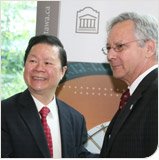 |
| Osgoode Hall -- Court of Appeal for Ontario |
The Court of Appeal for Ontario heard and decided the appeal of the champerty motion in the
St. Lewis v. Rancourt case on
November 8, 2013.
The Court dismissed the appeal without wanting to hear the responding parties (St. Lewis and University of Ottawa), and ordered costs against the Appellant (Rancourt).
The responding parties asked for "partial indemnity" costs of $29,950.66 (St. Lewis) and $19,890.75 (U of O), almost $50,000.00. They got $20,000.00 and $15,000.00, respectively. The costs decision was made immediately after the endorsement (i.e., written decision/reasons) for dismissing the appeal was read by Justice Alexandra Hoy, Associate Chief Justice of Ontario.
Rancourt spoke in French, which was translated for the two responding lawyers, Richard Dearden (representing St. Lewis) and Peter Doody (representing the University of Ottawa).
During Rancourt's presentation to the Court, which lasted approximately 35 minutes, he made the following arguments, and other points.
A. The University and St. Lewis have a champertous agreement, which is against the law in Ontario
[A champertous agreement is one where the maintaining party pays the legal costs of the plaintiff in order to share in the proceeds of the action.]
Key and undisputed facts are:
- The University is paying all the legal costs of the Plaintiff (St. Lewis).
- The Plaintiff has the written intention to give half of the punitive damages obtained from the action to the University.
The Ontario statute
An Act Respecting Champerty prescribes:
"All champertous agreements are forbidden, and invalid."
Therefore, lower court Justice Smith made an error contradicting the law, in being silent on Rancourt's request that the champertous maintenance be ordered terminated.
COURT: The Court found that there was not a champertous agreement since (the uncontradicted sworn evidence of the Plaintiff and of university president Allan Rock is that) the Plaintiff
unilaterally decided to give punitive damages proceeds to the University.
B. A lower court judicial bias complaint was never heard on its merits and is a ground for appeal
Rancourt sought to have a motion for reasonable apprehension of bias of lower court Justice Beaudoin judicially determined on its merits. The lower court circumvented this motion from ever being heard. A lower court leave to appeal to the Divisional Court was denied by leave judge Justice Annis.
Since the Supreme Court of Canada has determined that a bias complaint is heard either at the lower court when it is made, or on appeal, and since the champerty motion is tainted with bias, the reasonable apprehension of bias of Justice Beaudoin is a ground for appeal.
The enumerated evidence for reasonable apprehension of bias of Justice Beaudoin included (
see affidavit of evidence HERE-LINK):
- A terms of reference contract between the judge and the University of Ottawa, for a scholarship fund in the name of the judge's son.
- A boardroom named after the judge's son at the BLG lawfirm, which represents the University.
- A media article, recognized by the judge on the court record, in which the judge expresses the personal and emotional importance that he attributes to the scholarship fund, and to the boardroom at BLG.
- The fact that the judge recused himself rather than accept his responsibility to determine the reasonable apprehension of bias question, by alleging bad behaviour of the Defendant (Rancourt), in the way the request to bring the bias complaint was made, without taking action to correct the alleged bad behaviour.
- The fact that the judge threatened the Defendant (Rancourt) with contempt of court (a criminal charge), if Rancourt continued to advance his request, his argument.
- The fact that at no time prior to the hearing at which the judge recused himself did the judge mention his ties to the University of Ottawa or the BLG lawfirm.
- Other affidavit evidence (LINK).
Therefore, Rancourt argued to the Court of Appeal:
If it is permitted for a judge hearing a request for determination of a reasonable apprehension of bias to recuse himself without making the determination, and for the given reason of the behaviour of the requester in making the request, then we have crossed a line into a new and dangerous territory where the integrity of the court is threatened.
COURT: The Court of Appeal found that since the lower court leave judge, Justice Annis, had denied leave by finding in his reasons that this was not a case where reasonable apprehension of bias could possibly arise, the Court did not need to consider the ground of reasonable apprehension of bias.
C. The Plaintiff decided to sue after she was granted the University's funding of her lawsuit
Rancourt presented several streams of evidence, which the lower court had denied as not admissible on incorrect technical grounds (and/or apparently ignored), showing, he argued, that the Plaintiff (St. Lewis) decided to sue only
after the University funding was granted without limit and without conditions.
This is vital because, in establishing the abuse of maintenance, prior intent to sue is determinative, Rancourt argued, based on case law.
For example, Rancourt read a February 14, 2011 email from St. Lewis to university president Allan Rock, about the February 11, 2011 blogpost that is at the center of the defamation lawsuit (
see Factum HERE-LINK):
Hi there Allan,
I make it a practice to delete the communications from Mr. Rancourt and have done that in this case. It has spared me a great deal of aggravation in the past.
Do let me know if you want me to do anything. I will happy to fit into whatever strategy you decide but until then I intend to make no comment.
Do take care,
Joanne
COURT: The Court of Appeal found that the lower court judge had plenty/sufficient evidence to conclude that there was no maintenance and champerty. The Court did not state whether or not the denied evidence would have made a difference.
For more links to background documents (e.g., all Facta) go HERE-LINK.
For all the court-filed documents in the whole case go HERE-LINK.



























